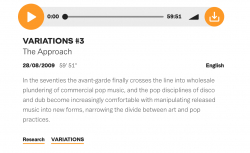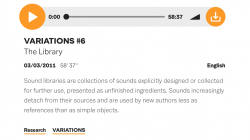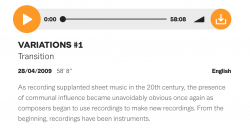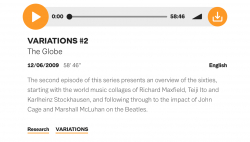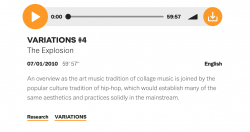VARIATIONS #5. The Discipline
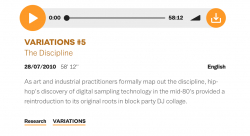
Type
Audio/Visual
Authors
Leidecker ( Jon Leidecker )
Category
Podcast
[ Browse Items ]
Publication Year
2010
URL
[ private ]
Duration
58:12
Tags
Abstract
Variations is a seven part series history of appropriative collage in music, compositions made using recordings of older ones. It's a practice that in the '80s became known sampling — after the digital sampler — a breakthrough instrument which was designed to mimic traditional musical instruments by allowing the player to trigger recordings of them back on a keyboard. But it didn't take long for musicians to realize that the true strength of the sampler was the way in which it made it easy easy to collage and manipulate the best sounds from their favorite records into new pieces of music. This practice entered the popular mainstream by the 80s, long after observers had already identified collage as the defining new art form of the 20th century — and the roots of this music go back just as far. Over the course of this series, Leidecker looks at these roots, as appropriative collage developed across experimental and mainstream paths.
As art and industrial practitioners formally map out the discipline, hip-hop's discovery of digital sampling technology in the mid-80's provides a reintroduction to its original roots.
As art and industrial practitioners formally map out the discipline, hip-hop's discovery of digital sampling technology in the mid-80's provided a reintroduction its original roots in block party DJ collage. The international success of the new genre then prompts a legal backlash against the art form, with a rash of lawsuits filed against both commercially successful pop artists like De La Soul, Biz Markie & 2 Live Crew and left-field provocateurs like the KLF, Negativland and John Oswald.
The audience that had come of age during the era of the studio-produced pop song was ready for a genre of music which made explicit use of earlier recordings to construct new music. A song with recognizable but altered samples reveals to the listener the same editing techniques used by engineers to compose music from disparate elements in the studio. The audience's growing comfort with the definition of a recording as the true site of a musical composition, instead of merely a document of a live performance, gives rise to a music that can now be made from any sound, including those made by any previous artist, sourced from any recorded age.
As art and industrial practitioners formally map out the discipline, hip-hop's discovery of digital sampling technology in the mid-80's provides a reintroduction to its original roots.
As art and industrial practitioners formally map out the discipline, hip-hop's discovery of digital sampling technology in the mid-80's provided a reintroduction its original roots in block party DJ collage. The international success of the new genre then prompts a legal backlash against the art form, with a rash of lawsuits filed against both commercially successful pop artists like De La Soul, Biz Markie & 2 Live Crew and left-field provocateurs like the KLF, Negativland and John Oswald.
The audience that had come of age during the era of the studio-produced pop song was ready for a genre of music which made explicit use of earlier recordings to construct new music. A song with recognizable but altered samples reveals to the listener the same editing techniques used by engineers to compose music from disparate elements in the studio. The audience's growing comfort with the definition of a recording as the true site of a musical composition, instead of merely a document of a live performance, gives rise to a music that can now be made from any sound, including those made by any previous artist, sourced from any recorded age.
Description
https://ubu.com/sound/leidecker.html
Number of Copies
1
| Library | Accession No | Call No | Copy No | Edition | Location | Availability |
|---|---|---|---|---|---|---|
| Main | 319 | 1 | Yes |
